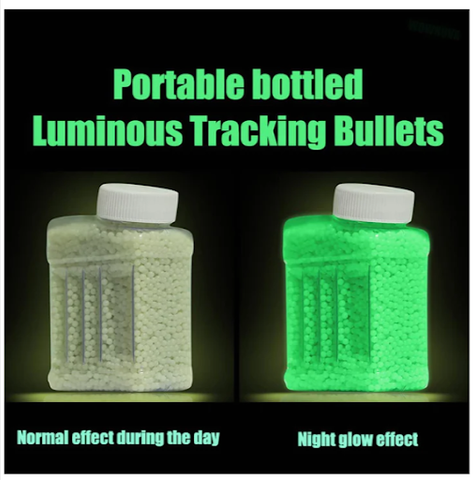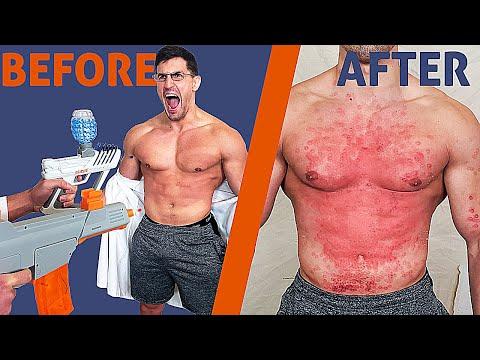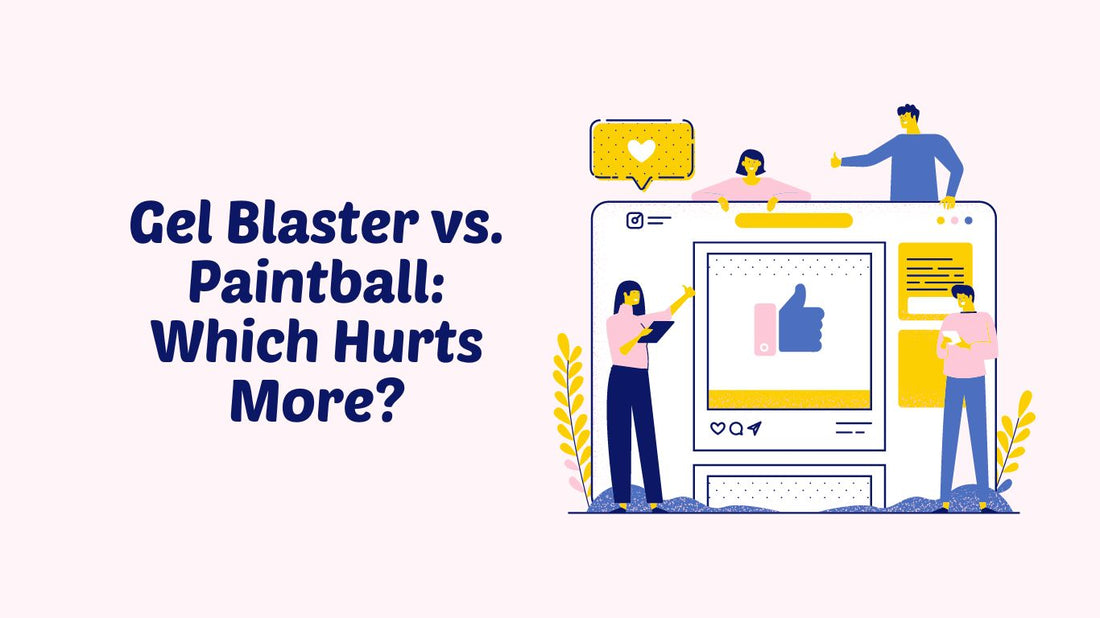¿Alguna vez has querido comparar las pistolas de gel y las bolas de pintura?
Si ya las has probado, este blog te resultará interesante porque realizaremos una comparación detallada entre pistolas de gel y pistolas de paintball para que tengas una idea clara de ambas armas de juguete y cuál duele más.
Comencemos con una tabla que muestra las diferencias entre las pistolas de gel y las bolas de pintura:
| Diferencia | Lanzador de gel | Pistola de paintball |
| Munición | bolas de gel | Bolas de pintura |
| Velocidad (FPS) | 250-280 | 300-400 FPS |
| Edad adecuada | Apto para mayores de 12 años | Apto para mayores de 18 años |
| Costo | $35-150 | $200-300 |
| Impacto | Menor impacto de disparo | Mayor impacto de disparo |
| Versatilidad | Más versátil y seguro | Menos versátil/no tan seguro |
| Reglas del juego | Reglas de juego más flexibles. | Reglas de juego más estructuradas |
| Dolor | Duelen menos que las bolas de pintura. | Duelen más que las pistolas de gel |
| Engranaje | Menos accesorios y equipo | Más equipamiento y accesorios |
Continuemos con esta épica comparación:
Parte 1: ¿Qué son las pistolas de gel y cuánto duelen?

Las pistolas de gel son pistolas de juguete que se ven y se sienten como armas de fuego.
Las pistolas de gel son similares al airsoft o al paintball en muchos aspectos. Sin embargo, las leyes y regulaciones sobre las pistolas de gel varían según la localidad. Por lo tanto, es importante consultar con las autoridades locales para obtener más información sobre su uso y legalidad.
¿Qué munición usan las pistolas de gel?
Las pistolas de bolas de gel disparan bolitas de gel hidratadas. Para preparar las bolas, basta con remojar las bolitas de gel deshidratadas en agua durante 3-4 horas. Las bolas de gel no son tóxicas y están disponibles en varias opciones, incluyendo fluorescentes .

Una vez listas las bolas de gel, se cargan en un cargador o tolva para disparar. Las bolas de gel pueden alcanzar más de 30 metros, dependiendo del modelo y la potencia de la pistola de gel.
¿Cuánto duelen las pistolas de gel?
El nivel de dolor causado por las pistolas de gel depende de varios factores. Estos factores incluyen la potencia de la pistola, la distancia de disparo y la zona del cuerpo donde se recibe el impacto.
Sin embargo, como han señalado los usuarios de Reddit , recibir un impacto de bolas de gel durante una partida normal suele causar una leve sensación de ardor. Esta sensación dura solo unos segundos y las bolas de gel no provocan hematomas ni marcas.

Sin embargo, al dispararse a corta distancia sobre una zona sensible, las bolas de gel pueden ser más dolorosas y causar hematomas. Por ejemplo, un disparo en la cara duele más que en el pecho.
La repetición es otro factor clave; cuanto más te disparen en el mismo sitio, más dolerá y más probabilidades habrá de que te salga un hematoma.
Mira el experimento que hizo un YouTuber para demostrar cuánto duelen las bolas de gel y el tipo de moretones que provocan los disparos a corta distancia con pistolas de gel en el pecho.

Parte 2: ¿Qué son las bolas de pintura y cuánto duelen?

Las pistolas de paintball son pistolas de juguete utilizadas en juegos de combate simulado a corta distancia. Funcionan propulsando bolas llenas de pintura a gran velocidad hacia los oponentes.
Antes de empezar a jugar, se cargan las bolas de pintura en un depósito situado encima de la pistola; desde ahí, las bolas de pintura se introducen en la cámara de disparo utilizando la gravedad o un sistema de alimentación motorizado.
Tras apretar el gatillo, la pistola de paintball libera aire comprimido o CO2 en la cámara de disparo. Esto impulsa las bolas de pintura fuera del cañón hacia su objetivo.

El mecanismo de disparo exacto utilizado por las pistolas de paintball puede variar; algunas utilizan sistemas de retroceso simples, mientras que otras emplean sistemas electroneumáticos más avanzados que controlan la liberación de aire y la cadencia de disparo.
Las marcadoras de paintball vienen en diversas formas, tamaños y estilos; también se pueden personalizar con accesorios como mejores sistemas de disparo, miras telescópicas, cargadores y tanques para adaptarlas a tus necesidades.
¿Qué munición utilizan las pistolas de paintball?

Las pistolas de paintball utilizan bolas rellenas de pintura (paintballs).
Las bolas de pintura vienen en diferentes tamaños, colores y tipos de relleno, y cada tipo de bola de pintura tiene especificaciones que pueden afectar el rendimiento de la marcadora y la experiencia de juego en general.
A continuación se muestran los diferentes tipos de munición de paintball:
- Bolas de pintura estándar: Este es, con diferencia, el tipo de bola de pintura más común; tiene un diámetro de 0,68 pulgadas. Las bolas de pintura estándar vienen en varios colores, incluyendo colores brillantes y neón que son fáciles de ver.
- Bolas de pintura de bajo impacto: Como su nombre indica, las bolas de pintura de bajo impacto tienen un impacto reducido, lo que las hace ideales para el juego recreativo. Tienen una cubierta más blanda y menos relleno; esto reduce la velocidad y el impacto de la bola al alcanzar un objetivo.
- Bolas de pintura de calidad profesional: Este tipo es ideal para el juego profesional y competitivo debido a la alta calidad de sus materiales y relleno, que ofrecen mayor precisión y consistencia. Suelen tener un diámetro de 0,68 pulgadas.
- Bolas de pintura First Strike: También conocidas como proyectiles First Strike, tienen una forma alargada única diseñada para aumentar la precisión y el alcance. Su relleno especial, más denso que el de las bolas de pintura convencionales, les permite alcanzar mayor distancia y resistir mejor el impacto.
Una bola de pintura disparada con una pistola estándar puede viajar a velocidades de 300 fps .
Dado que 1 fps equivale a 0,68 mph o 1,0973 kph, las pistolas de paintball con FPS de 280-400 fps pueden disparar bolas de pintura a 190-272 mph.
| FPS | MPH | KM/H |
| 280 | x 0,68 = 190,4 millas por hora | x 1,973 = 307,24 km/h |
| 300 | x 0,68 = 204 millas por hora | x 1,0973 = 329,19 km/h |
| 400 | x 0,68 = 272 mph | x 1,0973 = 438,92 |
¿Cuánto daño causan las pistolas de paintball?
Según Quora , las bolas de pintura duelen mucho, pero el dolor no es tan fuerte como para impedir que la gente vuelva a jugar al paintball una segunda o tercera vez.

Sin embargo, tenga en cuenta que el dolor causado por una pistola de paintball es subjetivo y depende de su umbral de dolor, pero puede ser lo suficientemente significativo como para causar moretones en la piel.
Algunos jugadores de paintball describen el dolor como una punzada aguda y persistente. El impacto puede causar moretones, ronchas y, a veces, incluso piel lacerada. Usar el equipo de protección adecuado durante el juego puede ayudar a minimizar el dolor y las lesiones.
El nivel de dolor que se siente al ser alcanzado por una bola de pintura varía dependiendo de factores como los siguientes:
| Factor | Su influencia en el nivel de dolor |
| Velocidad | Las pistolas de paintball de bajo impacto y sin modificaciones duelen menos que las modificadas de alto impacto. |
| distancia de viaje | Los disparos a quemarropa duelen más que los disparos desde lejos. |
| parte del cuerpo | Algunas zonas del cuerpo duelen más que otras. |
| Rebote/explosión | Una bola de pintura que rebota al impactar duele más. |
| Tomas repetitivas: | ¡Los golpes consecutivos de un jugador con gatillo fácil dolerán! |
Muchos jugadores de paintball describen el dolor punzante como un latigazo firme que persiste durante unos segundos. Dependiendo del impacto del disparo, se pueden sufrir lesiones, incluyendo heridas abiertas.
Parte 3: Diferencias entre pistolas de gel y pistolas de paintball
Ahora centrémonos un poco más en las diferencias cruciales entre las pistolas de gel y las pistolas de paintball, y exploremos cómo esto afecta al dolor causado por cada arma de juguete.
Tipos de munición
Las pistolas de gel utilizan bolas de gel hidratadas que son blandas y estallan al impacto; las pistolas de paintball utilizan bolas de pintura como munición; las bolas de pintura son más pesadas, duras y grandes que las bolas de gel.
Por ejemplo, el calibre .68 o 17,3 mm es el tamaño más común de las bolas de pintura. En cambio, la mayoría de las bolas de gel miden entre 7 y 8 mm.

Velocidad
Las marcadoras de paintball sin modificar tienen un FPS promedio de 280-300;300 es el FPS estándar para el paintball .
En cambio, la mayoría de las pistolas de gel tienen una velocidad de disparo de 90 a 300 FPS, pero esto se puede mejorar con modificaciones.
Peso y tamaño de la munición
Las bolas de pintura son más grandes y pesadas que las bolas de gel. Por eso, recibir un impacto de bola de pintura suele doler más que recibir un impacto de bola de gel.
Costo
Los kits de inicio para pistolas de gel comienzan desde tan solo $35, y una bolsa de 60,000 bolas de gel cuesta aproximadamente $20.
El precio medio de una pistola de paintball barata es de 100 dólares, y una bolsa de 2000 bolas de pintura cuesta entre 50 y 75 dólares.
Por lo tanto, el paintball es más caro que el gel blaster.
Legalidad
Las pistolas de gel tienen más restricciones y regulaciones legales, y más variadas en diferentes países, que las pistolas de paintball y las zonas de juego.
Por ejemplo, según el Brisbane Times, todos los estados y territorios australianos, excepto Queensland, consideran las pistolas de bolas de gel como armas de fuego. En cambio, son legales en otros lugares, como Estados Unidos.
Parte 4: ¿Las pistolas de gel duelen más que las de pintura?
No, las pistolas de gel no duelen más que las pistolas de paintball.
He aquí el porqué:
En primer lugar, las bolas de gel para pistolas de dardos son más pequeñas y mucho menos firmes que las de pintura. Aunque al impactar se esparcen por completo, como las de pintura, su tamaño y textura hacen que los impactos sean menos dolorosos. Las bolas de pintura pueden rebotar en lugar de esparcirse, ¡lo que puede doler más!
En segundo lugar:
Las pistolas de gel disparan bolitas de gel ligeras a base de agua. En cambio, las pistolas de paintball usan bolas de pintura rellenas de PEG, sustancias solubles en agua y tinte. Las bolas de pintura son más grandes, pesadas y rápidas (300 FPS) que las de gel (200 FPS). Por lo tanto, pueden causar más dolor al impactar.
La tercera diferencia entre las pistolas de gel y las pistolas de paintball que afecta al dolor causado son sus mecanismos de disparo.
Las pistolas de gel suelen usar un motor eléctrico a batería similar al de las de airsoft, mientras que las de paintball usan un mecanismo de aire comprimido. Esta diferencia en el mecanismo de disparo afecta la velocidad del proyectil. Las bolas de pintura se disparan a mayor velocidad, lo que las hace mucho más dolorosas que las de gel.

En cuanto a la seguridad, las pistolas de gel y las de paintball pueden causar lesiones si se usan incorrectamente. Por eso, es recomendable usar equipo de protección, como gafas y ropa de protección, al practicar ambas actividades y seguir las recomendaciones de seguridad estándar, como:
| Recomendación | Por qué es importante |
| Utilice equipo de protección | Esto ayuda a minimizar el riesgo de lesiones. |
| No dispares a otros jugadores a corta distancia. | Dispararse unos a otros a corta distancia causará más dolor y hematomas. |
| No apuntes a la cabeza, el cuello ni los ojos. | Estas son zonas a las que no se debe apuntar porque son muy sensibles y fáciles de lesionar. |
| Supervise siempre a los niños menores de 14 años. | Los niños menores de 14 años necesitan la supervisión de un adulto cuando practiquen deportes como el paintball o el uso de gel blaster. |
| Evite los disparos repetitivos al centro de la diana. | Evite apuntar al mismo punto en disparos consecutivos. |
Conclusión
Basándonos en todo lo que hemos comentado, está claro que tanto los disparos de pistolas de gel como los de paintball duelen, pero en general, las bolas de pintura duelen más que las de gel y es más probable que dejen una roncha.
Para concluir, recuerden este importante detalle:
Tanto si eres un aficionado a los juegos de disparos con gel como a los de paintball, usar equipo de protección y practicar un juego seguro es la mejor manera de minimizar el dolor y las posibilidades de lesiones accidentales.
Hemos tratado otras pautas clave para un juego seguro en nuestros otros blogs informativos, así que asegúrate de consultarlos.
¿Duelen las pistolas de gel? Directrices de seguridad para pistolas de gel (actualización de 2023)
Pistolas de gel explicadas: respuestas a 10 preguntas frecuentes sobre pistolas de gel
Pistolas de gel vs. pistolas de airsoft: diferencias, similitudes, características y cuál es mejor

